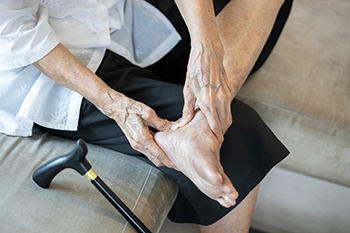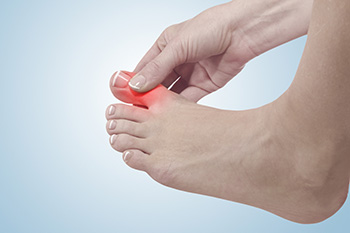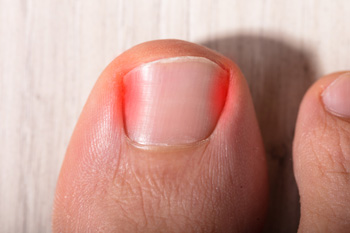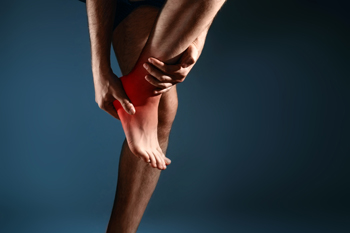
As we age, regular foot exercises can help maintain strength, flexibility, and balance, which are key factors in preventing falls and staying active. Simple movements such as toe curls, ankle circles, and heel-to-toe walking can improve circulation and reduce stiffness. Stretching the calf muscles and the plantar fascia also helps relieve tension and support stability. These exercises can be done seated or standing, depending on comfort and ability. Consistency is more important than intensity, and even a few minutes a day can make a meaningful difference. Stronger, more flexible feet contribute to better posture and safer movement. Before starting a new routine, especially for those with arthritis, diabetes, or foot pain, it is helpful to get professional guidance. If you are a senior experiencing foot discomfort or are unsure which exercises are safe for you, it is suggested you see a podiatrist for a diagnosis, treatment, and individualized guidance.
Stretching the feet is a great way to prevent injuries. If you have any concerns with your feet consult with Jim Maxka, DPM from South Penn Foot & Ankle Associates. Our doctor will assess your condition and provide you with quality foot and ankle treatment.
Stretching the Feet
Being the backbone of the body, the feet carry your entire weight and can easily become overexerted, causing cramps and pain. As with any body part, stretching your feet can serve many benefits. From increasing flexibility to even providing some pain relief, be sure to give your feet a stretch from time to time. This is especially important for athletes or anyone performing aerobic exercises, but anyone experiencing foot pain or is on their feet constantly should also engage in this practice.
Great ways to stretch your feet:
- Crossing one leg over the others and carefully pull your toes back. Do 10-20 repetitions and repeat the process for each foot
- Face a wall with your arms out and hands flat against the wall. Step back with one foot and keep it flat on the floor while moving the other leg forward. Lean towards the wall until you feel a stretch. Hold for 30 seconds and perform 10 repetitions for each foot
- Be sure not to overextend or push your limbs too hard or you could risk pulling or straining your muscle
Individuals who tend to their feet by regular stretching every day should be able to minimize foot pain and prevent new problems from arising.
If you have any questions, please feel free to contact our office located in Hanover, PA . We offer the newest diagnostic and treatment technologies for all your foot care needs.

Big toe pain can be incredibly painful and disruptive, affecting your ability to walk or wear shoes comfortably. The pain can be caused by a number of factors, including injury, toenail problems, or gout. An injury to the big toe, such as a sprain or fracture, can cause throbbing pain, swelling, and difficulty moving the toe. Toenail issues, like ingrown toenails or fungal infections, can lead to sharp pain, redness, and tenderness around the nail. Gout, a type of arthritis, often targets the big toe, causing sudden, intense pain, swelling, and a feeling of heat, typically at night. Symptoms of big toe pain include sharp or throbbing pain, swelling, redness, or a decreased range of motion. A podiatrist can help by diagnosing the underlying cause of the toe pain through a physical exam and imaging tests. Treatment may include medication, proper footwear, toenail care, or even surgery for more severe cases. If you are dealing with big toe pain, it is suggested that you make an appointment with a podiatrist for a proper diagnosis and treatment.
Toe pain can disrupt your daily activities. If you have any concerns, contact Jim Maxka, DPM of South Penn Foot & Ankle Associates. Our doctor can provide the care you need to keep you pain-free and on your feet.
What Causes Toe Pain?
Most severe toe pain is caused due to a sports injury, trauma from dropping something heavy on the toe, or bumping into something rigid. Other problems can develop over time for various reasons.
Toe pain can be caused by one or more ailments. The most common include:
- Trauma
- Sports injury
- Wearing shoes that are too tight
- Arthritis
- Gout
- Corns and calluses
- Hammertoe
- Bunions
- Blisters
- Ingrown toenails
- Sprains
- Fractures (broken bones)
- Dislocations
When to See a Podiatrist
- Severe pain
- Persistent pain that lasts more than a week
- Signs of infection
- Continued swelling
- Pain that prevents walking
Diagnosis
In many cases the cause of toe pain is obvious, but in others, a podiatrist may want to use more advanced methods to determine the problem. These can range from simple visual inspections and sensation tests to X-rays and MRI scans. Prior medical history, family medical history, and any recent physical traumatic events will all be taken into consideration for a proper diagnosis.
Treatment
Treatments for toe pain and injuries vary and may include shoe inserts, padding, taping, medicines, injections, and in some cases, surgery. If you believe that you have broken a toe, please see a podiatrist as soon as possible.
If you have any questions please feel free to contact our office located in Hanover, PA . We offer the newest diagnostic tools and technology to treat your foot and ankle needs.

An ingrown toenail happens when the edge of the nail grows into the skin, causing pain, swelling, and sometimes infection. One helpful treatment is a gutter splint. This is a small, smooth tube placed under the edge of the nail to gently lift it away from the skin. The splint takes pressure off the sore area and gives the skin a chance to heal. Over time, the nail grows out in a better position. Gutter splints are used when the problem keeps coming back or when surgery is not the best option. They are safe, do not hurt, and can be a good choice for both children and adults. A podiatrist will make sure the splint fits right and teach you how to care for your toe at home. If you have a painful ingrown toenail, it is suggested that you see a podiatrist for a proper diagnosis and treatment.
Ingrown toenails may initially present themselves as a minor discomfort, but they may progress into an infection in the skin without proper treatment. For more information about ingrown toenails, contact Jim Maxka, DPM of South Penn Foot & Ankle Associates. Our doctor can provide the care you need to keep you pain-free and on your feet.
Ingrown Toenails
Ingrown toenails are caused when the corner or side of a toenail grows into the soft flesh surrounding it. They often result in redness, swelling, pain, and in some cases, infection. This condition typically affects the big toe and may recur if it is not treated properly.
Causes
- Improper toenail trimming
- Genetics
- Improper shoe fitting
- Injury from pedicures or nail picking
- Abnormal gait
- Poor hygiene
You are more likely to develop an ingrown toenail if you are obese, have diabetes, arthritis, or have any fungal infection in your nails. Additionally, people who have foot or toe deformities are at a higher risk of developing an ingrown toenail.
Symptoms
Some symptoms of ingrown toenails are redness, swelling, and pain. In rare cases, there may be a yellowish drainage coming from the nail.
Treatment
Ignoring an ingrown toenail can have serious complications. Infections of the nail border can progress to a deeper soft-tissue infection, which can then turn into a bone infection. You should always speak with your podiatrist if you suspect you have an ingrown toenail, especially if you have diabetes or poor circulation.
If you have any questions, please feel free to contact our office located in Hanover, PA . We offer the newest diagnostic and treatment technologies for all your foot care needs.

Heel pain is a frequent complaint that can interfere with daily life, whether it starts suddenly or develops over time. Injuries and disorders affecting the heel include plantar fasciitis, Achilles tendonitis, heel spurs, and bursitis. These conditions often result from repetitive stress, poor footwear, or biomechanical issues such as flat feet or high arches. Some individuals may experience sharp pain with the first steps in the morning, while others notice discomfort after long periods of standing or activity. Ignoring heel pain may lead to worsening symptoms and further injury. Treatment often includes rest, wearing supportive shoes, stretching exercises, and, in some cases, custom orthotics. If you are experiencing persistent heel pain or discomfort that is limiting your mobility, it is suggested that you see a podiatrist for a proper diagnosis and treatment to restore comfort and function.
Many people suffer from bouts of heel pain. For more information, contact Jim Maxka, DPM of South Penn Foot & Ankle Associates. Our doctor can provide the care you need to keep you pain-free and on your feet.
Causes of Heel Pain
Heel pain is often associated with plantar fasciitis. The plantar fascia is a band of tissues that extends along the bottom of the foot. A rip or tear in this ligament can cause inflammation of the tissue.
Achilles tendonitis is another cause of heel pain. Inflammation of the Achilles tendon will cause pain from fractures and muscle tearing. Lack of flexibility is also another symptom.
Heel spurs are another cause of pain. When the tissues of the plantar fascia undergo a great deal of stress, it can lead to ligament separation from the heel bone, causing heel spurs.
Why Might Heel Pain Occur?
- Wearing ill-fitting shoes
- Wearing non-supportive shoes
- Weight change
- Excessive running
Treatments
Heel pain should be treated as soon as possible for immediate results. Keeping your feet in a stress-free environment will help. If you suffer from Achilles tendonitis or plantar fasciitis, applying ice will reduce the swelling. Stretching before an exercise like running will help the muscles. Using all these tips will help make heel pain a condition of the past.
If you have any questions please contact our office located in Hanover, PA . We offer the newest diagnostic and treatment technologies for all your foot and ankle needs.
